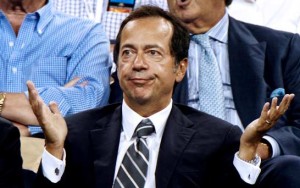
I feel like there are lessons about philanthropy in John Paulson’s $400 million gift to Harvard that I haven’t seen explained yet.
I don’t know John Paulson (maybe that’s already obvious?) but I feel like I know a little bit about how he thinks, having worked with, for, and as a mortgage bond professional, and with, for, and as a hedge fund investor.
John Paulson is most famous for making $4 Billion in 2008 via the The Greatest Trade Ever, shorting sub-prime mortgage bonds through his eponymous hedge fund. Last week he shot back into the public eye for his philanthropy and the subsequent negative reactions to his gift, spearheaded by smart guys like Malcolm Gladwell and other pundits.
In reviewing reactions to his $400 million gift to Harvard’s School of Engineering and Applied Sciences, I’m struck that I haven’t heard an accurate description of Paulson’s reasoning, based on what we know about him. The overwhelming reaction of the smart guys is to complain that Harvard is one of the least deserving ‘charities’ around. Further, the conventional-wisdom smart guys complain, couldn’t he have found a charity to address poverty, or something more worthy, rather than make an already elite institution more elite?
Having worked with guys like Paulson, and understanding a bit about his professional background and track record, I know the following four things:
1. He’s focused on value. He would prefer to die rather than overpay for something.
What I mean by that is that when Paulson pays $400 million to Harvard for naming rights and also to get credit for the largest gift ever to a University, he’s not being careless about the amount. If he could get that kind of value for $375 million, he would have paid $375 million, not $400 million. Whatever the ultimate purpose of the gift (and I don’t pretend to know that, any more than I really know the inner thoughts of Paulson) he didn’t come up with $400 million by accident. And whatever his reasoning, and no matter how large the headline number, he was not overpaying.
2. He wants the #1 best thing. Not tenth best, not seventh best, not second best. Just the number one best thing. This next statement may sound flippant, and it may sound like I’m being Harvard-proud, and I really don’t mean to be. But if Paulson felt like he could have gotten what he wanted by donating to Dartmouth he would have done it. He chose Harvard because it struck him as the best.
Giving to ‘the best,’ obviously, is a different mind-set than giving to the ‘most worthy.’
Paulson’s critics feel he should have found a worthier cause than Harvard. Maybe so. But is that theoretical preferable charity the absolute best in the world at what they do? I suspect that criteria mattered to Paulson, as it does to many people who think like Paulson.
3. Risks matter tremendously. If he’s going to pay good money, the risks should be minimized. I think this point is probably key to why he didn’t give $400 million to a program to combat poverty, or end malaria, or whatever it is that Gladwell would have preferred he do. By giving to Harvard, Paulson can be certain that the institution will continue to thrive and be a steward of his funds 50 years from now. Did Paulson analyze the existing anti-poverty charities and find them too risky? I wouldn’t be shocked if he did.
Short of giving to the Bill and Melinda Gates Foundation 1, I’m not sure how one gives huge sums of money to an anti-poverty charity at that scale while still minimizing one’s risks.
I’m not trying to argue that anti-poverty charities (or whatever Gladwell wants him to give to) are inherently risky. I actually have no idea. What I mean is that Paulson – by trade and by training as a hedge fund guy – has to be incredibly focused on risk management. You can’t succeed the way he has without applying the same eye for risk to one’s philanthropy. The one thing Harvard has over almost any other ‘charity’ is its image as a prudent low-risk investment.
Why would anyone like Paulson give to a ‘charity’ that already has a $36 billion endowment? Its a safe bet, that’s why.
4. The “smart guys” like Gladwell who represent conventional wisdom? Paulson does not give a fuck.
Just to expand for a moment on this fourth point, and to boil it down further with mathematical precision: Paulson gives precisely zero fucks what Malcolm Gladwell writes on Twitter.
Paulson’s “career trade” was made by understanding which way the entire mortgage bond market was positioned in 2008, and then he made the exact opposite bet, at extraordinary risk to himself and to his investors. In hindsight, he was a genius, but that move was incredibly difficult to make at the time, when every other short-seller of the mortgage bond market up until that point had gotten their ass handed to them.
Paulson’s smart enough to understand how the rest of the world thinks, but iconoclastic enough to lay that aside to determine what he alone thinks.
Most of us have a hard time going that strongly against the grain of public thought. Paulson’s entire career success is based on extreme contrarianism.
Lessons of Paulson’s gift
At the risk of trying to tie this all up with a neat bow, I think philanthropies can learn from the lessons of Paulson’s gift.
To appeal to a certain type of giver like Paulson, the point shouldn’t be to try to be the ‘worthiest’ cause in the universe, but rather to offer good value for the money. People who have made a lot of money in their lifetime tend to respond to value arguments – how will their gift have a bigger impact with you, rather than with someone else?
Further, are you the absolute best in your category? Forget neediness or worthiness. I suspect neediness is in fact a major turnoff for big donors. But excellence and being #1? Are you the Harvard of your category? I bet that’s very attractive to Paulson.
Next, are you a low risk? People who manage money for a living and who have a large fortune to steward want to see their money managed wisely, even after it’s given. Especially after it’s given.
Finally, does your donor give in order to be part of the in-crowd? Or to be an iconoclastic contrarian? We know by reputation that Paulson’s going to do whatever he thinks, not what the rest of the people think. That’s probably rare, but in the case of Harvard as a recipient, to their ultimate benefit.
 I bet most people are social givers, eager to become or remain as a member of a social group, and philanthropic efforts to keep them appreciated as part of an inner circle probably matter a lot. Contrarians are rarer, but in Paulson’s case, can turn out quite nicely too.
I bet most people are social givers, eager to become or remain as a member of a social group, and philanthropic efforts to keep them appreciated as part of an inner circle probably matter a lot. Contrarians are rarer, but in Paulson’s case, can turn out quite nicely too.
[Fake full-disclosure/non-disclosure: I have given precisely zero dollars to my alma mater Harvard in the twenty years since I graduated from there, and I also give precisely zero fucks about Harvard’s philanthropic needs.]
Please see related posts
On Philanthropy Part I – Giving Money Away
On Philanthropy Part II – Asking for Money
My actual preferred philanthropic interest, the Greatest High School In The World
Post read (1515) times.
- Which, frankly, would also have been a good bet as a 50-year steward of Paulson’s funds ↩






